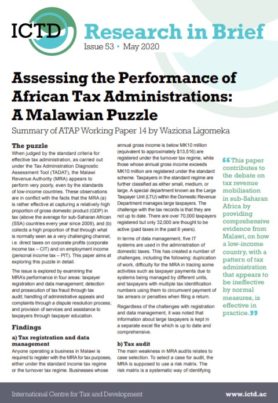Research in Brief 53
When judged by the standard criteria for effective tax administration, as carried out under the Tax Administration Diagnostic Assessment Tool (TADAT), the Malawi Revenue Authority (MRA) appears to perform very poorly, even by the standards of low-income countries. These observations are in conflict with the facts that the MRA (a) is rather effective at capturing a relatively high proportion of gross domestic product (GDP) in tax (above the average for sub-Saharan African (SSA) countries every year since 2009), and (b) collects a high proportion of that through what is normally seen as a very challenging channel, i.e. direct taxes on corporate profits (corporate income tax – CIT) and on employment income (personal income tax – PIT). This paper aims at exploring this puzzle in detail. The issue is explored by examining the MRA’s performance in four areas: taxpayer registration and data management; detection and prosecution of tax fraud through tax audit; handling of administrative appeals and complaints through a dispute resolution process; and provision of services and assistance to taxpayers through taxpayer education.
